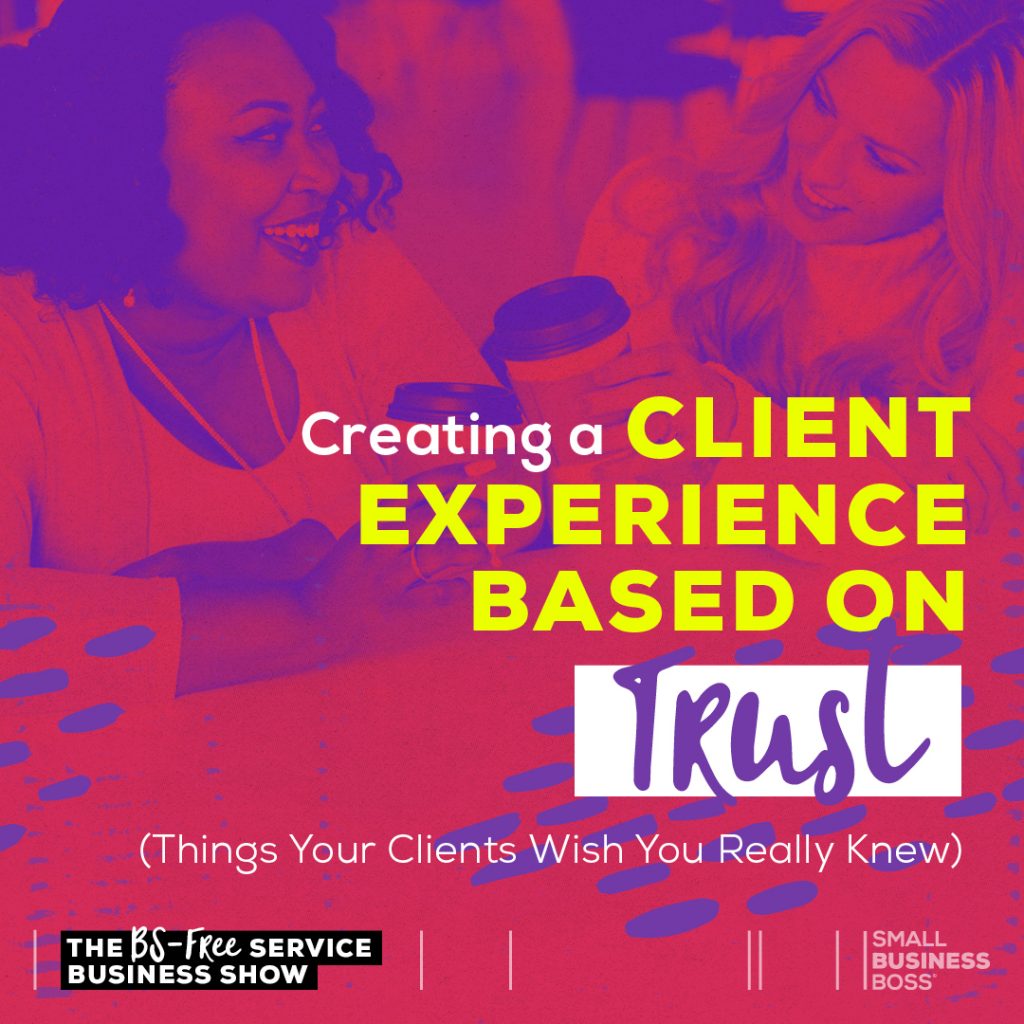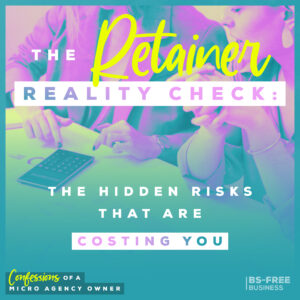
Search the site:
Creating a Client Experience Based on Trust (Things Your Clients Wish You Really Knew)
When it comes to running a business we talk so much about marketing and sales, but what happens once someone becomes a client? After all, that’s where most of us spend the majority of our time, and more importantly, that’s what we get paid for. In this episode we’re looking at how to create a client experience based on trust, and all the things your clients wish you really knew.
I’m sure you’ve been on the receiving end of a bad customer service experience at some point. Maybe not in your business, but you’ve had that moment where you have buyer’s remorse and you get super frustrated.
One of my first customer experiences as an adult was with the banks that held my student loans. Two different banks, and they both screwed up my paperwork once I graduated and needed to start paying. In one case they’d lost my paperwork completely resulting in me being in default, and in the other case they were charging interest incorrectly.
At the time it was pretty stressful and horrible to deal with, but with the hindsight of time, I’m grateful for that experience as it taught me the importance of every single client or customer being seen and heard.
And it’s a big reason that from the very start of my career, I’ve been very committed to ensuring clients had a great experience working with me.
The Status Quo of CX in Online Business
When I started working in the online business world, I found myself shocked by how people would talk about clients, and what was considered okay when it comes to serving clients.
Looking at the status quo of client experience, bad experiences are far too common across this industry, and that my friends, is an opportunity for you. If you focus on client experience and understanding what your clients really want from you, you’ll have happy, loyal clients who keep working with you, give you glowing testimonials and send business your way.
Your happy clients all have one thing in common: you’ve earned their trust. It’s far too easy to make the mistake of thinking that someone trusts you once they purchase from you, but you need to think of trust as a continuum.
At the point someone buys from you, there’s a baseline level of trust, and from there you can build more trust, or do things that break it. For each of us working with clients, we need to find ways to build trust using what I call “micro moments” that build trust up over time, and let more and more trust accumulate.
Unfortunately in online business, there’s so much focus on marketing and sales, that many times CX is an afterthought. A lot of people simply don’t care what happens once they make the sale, or they neglect their clients, or worse yet, label them as a problem.
Working with clients can be challenging and bad client situations are going to happen, but I believe many times we’re too quick to judge, too flippant in our complaining and we fail to own our role in the situation.
A common storyline I see online all the time is that of the “bad” nightmare client, which is funny on the surface until you take a harder look. What these stories often have in common is that they reduce people and situations to a trope about bad clients, and there’s little recognition of the fact that many times we have a role to play in how things went down.
As a service provider, the service part of your business is just as, if not more important than your sales or marketing. And it’s up to all of us to take real ownership of that and build trust that lasts with clients.
This is where the five trust cores come in. By focusing on truth, transparency, time, results and respect, you have a baseline for ways to build trust, because when these things are done wrong, they break your client’s trust. They chip away at trust, and over time that leads to bigger issues.
Truth
We’ve all been there. A client situation where you dropped the ball or screwed up and you’re not sure what to do.
In any relationship not everything is going to go according to plan 100% of the time, and when things are off the rails, it’s easy to go into self-preservation mode and lie or manipulate your clients to cover your own ass.
In my 20+ years in client facing roles, I’ve screwed up big time along the way. Some of them were downright terrible, but I learned quickly that honesty is always the best policy.
The key is owning your role in the situation and having a way to fix it already figured out. So many times in the online business world I’ve seen people let their ego get in the way and they blame their client, their team or anyone else they can think of.
While that’s a common way of handling things, it doesn’t mean it’s okay to conceal or distort the truth from our clients. When you twist the truth around you’re risking doing much more damage and you’re likely to degrade trust much more than the facts ever would.
Transparency
To build trust you need transparency as people need to be clear on what’s happening. They need to have confidence that what you see is what you get over the course of your relationship.
In the context of online business, many times service providers do a downright terrible job of keeping their clients in the loop. And when your clients always have to ask for an update or are left wondering if they’ve been ghosted, you’re breaking their trust.
Another way that transparency fails is when people don’t provide their clients with the tools needed to be successful. Maybe you’ve worked with a coach that made assumptions about what you needed or they provided you with completely subpar support. Part of serving clients is constantly and consistently ensuring they have what they need and that you’re holding up your end of the bargain.
So many of us have been screwed out of our money by service providers and coaches and celebrity entrepreneurs who promised one thing and then delivered another, and it’s not okay.
Again, this is an opportunity for you. Start by making a consistent practice of communication with your clients so they know what happens next and what they can expect from you. If you say they’ll hear from you on Tuesday or you’ll provide the design to them to review then, make sure you do it on Tuesday.
If they appear to be blocked, it’s your job as the service provider to follow-up and ensure that they have what they need. We need to stop acting put upon by our clients when they’re not sure about something or they need more guidance, because many times that’s the result of us not giving them something they need.
Most of all, do your damndest to ensure your clients don’t have surprises. Be clear and consistent in everything you do.
Set up regular touchpoints so you communicate consistently and use a project management system to keep everything on time, every time.
Time
Now, you may be wondering how time factors into client experience, but actually it’s way more of a factor that most people realize.
Time is a big part of trust, and as service providers we need to set realistic expectations for our clients about how long something will really take. A common problem is for us to overpromise and overdeliver, when really if we were just realistic from the onset, we’d build way more trust along the way.
As part of client experience, you need to be clear with your clients about how much time they get from you. This one can be tricky to navigate, but one of the main problems I see in online business is such a severe lack of access to people (especially coaches) that people are paying to work with that they can’t be successful.
If you have set calls, think about how you can build some breathing room into things so that if another call is needed, you can be generous and not feel like the client is pushing your boundaries.
Speaking of boundaries, in no way am I advocating for you to be anyone’s doormat, but rather to think about time in a way that means you can deliver an outstanding client experience. If your client always feels rushed, ignored or forgotten their trust in you will be trashed pretty quickly.
Finally, when it comes to CX, consider what a realistic timeframe is for clients to review deliverables from you, provide feedback and respond to your requests. Things may feel urgent to us, but for our clients, we’re only one thing on the list, and constantly rushing them through things because that’s what’s best for us, doesn’t build trust.
When you prepare timelines, build in appropriate turnaround and response times so you can support them in a way that works for everyone. Plus, the timeline is a way for you to manage expectations around time from day one so that you’re able to avoid a mad rush to the finish line.
Results
In the last few episodes, I’ve shared a lot about my approach to results when it comes to sales and marketing, but what I have to say about results as part of CX is even more crucial.
The way results are done in the online business world is broken AF and it does everything possible to degrade trust.
The typical online business approach to results is client-centric, where clients are wholly responsible for outcomes. In coaching and masterminds and group programs, we’re taught that we’re responsible for our outcomes, which sounds reasonable until you realize this is an avoidance strategy.
Think about it. If the client is always responsible for their results, then the product, program or coaching doesn’t actually have to fulfill its promise. They can deliver a subpar offer where the majority of people don’t succeed.
Clients are left to shoulder the burden of success so there’s no accountability to the seller.
I don’t need to tell you how messed up this is to blame clients for their misdeeds and lack of competence.
As someone who works with clients outside of this industry, I can’t even wrap my head around how you tell someone paying you that it’s their fault.
Sure there are situations where a client is going to not do their work, but when it comes to CX, results are a shared responsibility. I can’t make my clients do their work or deliver what’s needed, but I can identify barriers to success and hold up my end of the bargain.
Honestly, I can’t even imagine if I ever told a corporate client that I wasn’t responsible for their results. That would break trust at record speed and I’d have a terminated contract on my hand pretty damn quickly.
Respect
Building on what I covered when talking about results, the lack of respect for paying clients in the name of boundaries and all kinds of other bullshit is rampant in the industry.
I think that people forget that when you run a business you’re being paid to serve clients and customers.
What I’m not talking about are clients that break boundaries and behave poorly. I’m talking about your average run-of-the-mill client that simply wants to be seen, heard and get whatever they paid for.
This rampant lack of respect shows up in so many ways:
- Constant pressure and upsells to spend more money with no regard for budgets or other considerations.
- Challenges to authority of the coach or service provider aren’t tolerated and any questions are dismissed being unwilling to do what it takes.
- Toxic positivity where anything negative is shut down or chalked up to being a mindset issue.
I could go on and on and on, but respect is in short supply in online circles, and many times we’re so wrapped up in the performance of these people selling to us that we don’t even notice that they’re not doing anything to serve us.
So what’s the alternative? How do we build trust by relying on respect?
It’s something I call clear and kind communications where you focus on building trust by being respectful and honoring mutual boundaries.
Let me explain. Boundaries are important, but they’re also a two-way street. We need to be as respectful of our clients’ boundaries as we want them to be of ours. It may sound simple but the reality is that boundaries can backfire in CX as we become all rigid and rules focused and forget we’re humans dealing with other humans.
I learned a lot in 2020, but one of the best and biggest reminders I got was around showing up for my clients. That meant being flexible at times within my own boundaries. That allowed me to be kind and of service so I could honor their needs.
As a wrap up to talking about respect, I want to quickly discuss “kind” communications and what that means. To be clear, this doesn’t mean being nice. At the root of being nice is a need to be liked, but with kindness, you’re most concerned about being well, kind. When you focus on kindness, you’re doing what’s best for you and the client, because you want to do what’s right, not just saying what someone wants to hear in order to avoid upsetting them.
One of the best ways to be kind with your clients is to be helpful, hold your boundaries and to treat them well. Communicating with kindness and consistency conveys respect, and it builds trust.
Let Trust be the Secret Sauce of Your CX
With your CX, every interaction you have with your clients is an opportunity to build trust. When you filter everything through trust, you’re going to deliver the kind of CX that makes your clients love working with you.
Remember, the five trust cores provide trail markers for you as you work to build trusted relationships with your clients. It gives you a way to constantly check in on what you’re doing and think critically and carefully about how you’re serving your clients.
For me, and I’m sure it’s true for most of your clients, it’s the small things that matter. They accumulate over time so that trust gets stronger and you’re able to handle any bumps along the way.
If you work with clients, trust is everything.

I’m Maggie Patterson (she/her), and services businesses are my business.
I have 20+ years of experience with client services, am a consultant for agency owners, creatives, and consultants, and vocal advocate for humane business practices rooted in empathy, respect, and trust.
Read or Listen to the Latest
For Solo Business Owners

Growing a solo service business is tough.
It’s even harder when you’re bombarded with BS advice that steers you away from your values and why you started your business in the first place.
This is the podcast for solo creatives and consultants who want to remain as a team of one and have zero interest in the hustle and grind of typical business teachings.
Subscribe now and never miss an episode.
For Micro Agency Owners
Most podcasts for agency owners obsess over revenue growth as the ultimate success metric.

But here’s the truth: not everyone wants to make millions. Your goal might be to build a sustainable business that lets you have a life and doesn’t run you into the ground.
Join me as I spill my shameless confessions and share everything I’ve learned about building a micro agency that skips the BS of tired and typical agency teachings.
Follow Now on All Major Podcast Platforms








